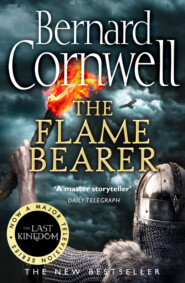По всем вопросам обращайтесь на: info@litportal.ru
(©) 2003-2025.
✖
War of the Wolf
Автор
Год написания книги
2019
Настройки чтения
Размер шрифта
Высота строк
Поля
‘Why haven’t you taken them yet?’
‘I don’t feel worthy, lord.’
I gave her a sceptical look. ‘Prince Æthelstan believes you’re the holiest woman he knows.’
‘And the prince is a good man, lord, a very good man,’ she said, smiling, ‘but he doesn’t know women very well.’
Something in her tone made me look at her again, but her face was all innocence, so I ignored her remark. ‘So what will you do in Mameceaster?’ I asked instead.
‘Pray,’ she said, and I made a scornful sound. ‘And heal the sick, lord.’ She gave me her dazzling smile. ‘And what’s your business, lord, that makes you abandon me?’
‘I have to kill a monk,’ I told her, and, to my surprise, she laughed.
We left them next morning, striking west into wooded hills. I had not been truthful with Mus, our quickest route was to follow the convenient Roman roads, but I needed to approach Arnborg’s settlement without being discovered, and that meant cutting across the country, finding our way by instinct and by the sun. I doubled my scouts. We were entering land where the Danish had been reinforced by Norse settlers, where few Saxons survived, land that had been claimed by Mercia, but never occupied by Mercian troops. Mameceaster, the nearest burh, had been made deep in this land, a defiant gesture by Edward that claimed that he was king of all the country south of the burh, but many of the people here had not even heard of Edward.
The land was rich, but sparsely settled. There were no villages. In southern Mercia and in Wessex, which was now supposedly all one kingdom, there were settlements of cottages, usually built around a church and with no defensive palisade, but here what dwellings existed were almost all behind strong timber walls. We avoided them. We ate hard cheese, stale bread, and smoked herrings that Æthelstan’s steward had given us from his storehouses. We carried forage bags for the horses because the spring grass was still weeks away. We slept in the woods, warmed by fires. Folk would see those fires and wonder who had set them, but we were still far south of the Ribbel, and I doubted that Arnborg would hear of us. Men must have seen us, even if we did not see them, but all they saw were some ninety armed riders with their servants and spare horses. We flew no banner, and the wolf heads on our shields were faded. If any folk did see us they would avoid us because in a dangerous land we were the danger.
Next day, late in a cold afternoon, we saw the Ribbel. It was a sullen day with a grey sky and a grey sea, and ahead of us stretched the wide estuary where grey mudbanks were edged with endless marshes. Smoke rose into the windless air from a dozen settlements on the estuary’s shores. No ships disturbed the river’s channels that threaded the mud, though I could see a score of fishing boats hauled above the high-tide mark. It was close to low tide now and some of the withies marking the channels were out of the water, which swirled fast and flat. The tide was big there, and the river was draining to the sea. ‘Good living,’ Finan murmured, and he was right. I could see the fish traps in the tangled channels, and both the mudbanks and the water were bright with birds; seabirds and shorebirds, swans and waders, godwits and plovers, geese and sanderlings. ‘Dear God,’ Finan said, ‘but look at those fowl! You’d never go hungry here!’
‘There’s good salmon too,’ I said. Dudda, a shipmaster who had once guided us across the Irish Sea, had told me the Ribbel was a marvellous river for salmon. Dudda was a drunkard, but a drunkard who knew this coast, and he had often told me his dream of settling beside the Ribbel’s estuary, and I could see why.
The settlers were Norsemen now. I doubted they had seen us. We had approached the river slowly, leading our horses, only moving when our scouts gave a signal. Most of my men and all our horses were now in a swale of icy puddles and brittle reeds, hidden from the river lands by a low rise crowned with trees and brush where I had posted a dozen men. I joined them, climbing the shallow slope quietly and slowly, not wanting to explode birds from their nests, and once on the crest I could see far across the estuary, and see rich steadings, too many steadings. As soon as we rode out of the icy swale we would be seen, and the news of armed strangers would spread across the river lands, and Arnborg, wherever he was, would be warned of our coming.
I was gazing at the closest steading, a substantial hall and barn surrounded by a freshly repaired palisade. The thatch on one of the lower buildings was new, while smoke rose from a hole in the highest roof. A boy and a dog were driving sheep towards the steading’s open gates where one man slouched. The man was far away, but Finan, who had the keenest eyesight of any man I knew, reckoned he wore no mail and carried no weapon.
Вы ознакомились с фрагментом книги.
Приобретайте полный текст книги у нашего партнера:
Приобретайте полный текст книги у нашего партнера:











